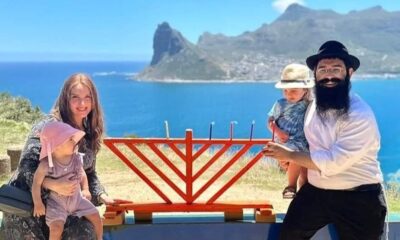
Banner

Will the ‘Elders’ guide Cape community forward?
Published
2 years agoon
A group of senior, experienced and committed leaders have formed an advisory group in Cape Town, calling themselves The Elders Group, to guide the community through challenges. However, two members of the community have questioned the democratic nature of this group, its access to communal resources, and even its name.
“A group styling themselves as The Elders Group wrote to members of Cape Town’s Jewish community with a Community Progress Report [on 1 July]. Who on earth are these ‘Elders’, and who appointed them?” Judge Dennis Davis and Gilad Stern wrote to the SA Jewish Report. “We are ourselves not spring chickens, but would hardly call ourselves ‘Elders’ — hence our incredulity at the contents of their letter.”
Philip Krawitz, chairperson of The Elders Group (TEG) explains how the group came about: “For a number of years, the senior Cape Town communal leadership liaised informally in respect of communal issues. Shortly before the pandemic, a number of us started arranging weekly calls to discuss challenges facing our community. Communal entities started calling on us for guidance and we decided to call ourselves ‘The Elders Group’. The collective experience of this group covers decades of involvement spanning the entire community.”
The original members included Krawitz, Lance Katz, Samuel Seeff, Ronnie Stein and Marco van Embden. Alison Berk Katzeff, Natalie Barnett and Rael Kaimowitz have since been co-opted. A fourth person is yet to be co-opted.
“Our involvement covers, in the main, the raising and disbursement of funds in the best interests of the community. The group has been integrally involved in virtually every aspect of Jewish life in Cape Town, apart from religious affairs, which we see as the domain of the Beth Din, and political issues, which we believe should fall under the Board of Deputies,” says Krawitz.
“At the start of the pandemic, we undertook an emergency campaign raising R34-million,” he continues. “Needless to say, TEG members led by example. By working together, we have managed not only to raise substantial funds for the Covid crisis, but also for our annual campaign.
“In several instances, we have been involved in efforts aimed at Shalom bayit [literally ‘peace in the home’, or resolving internal conflicts]. The essential quality of the TEG has been a focus on the community as a whole. We often speak of putting on ‘The Big Communal Kippah!’ Another aim is to assist with the implementation of the ground-breaking Vision 2040 Project.”
The Vision 2040 Project “was initiated a few years back by the Priorities Board (funded by the David Susman Community Foundation) to take a long-term look into the future of our community and its needs,” explains Krawitz. “This has been expertly driven by Raoul Miller and an outstanding group of young leaders. They have interacted with virtually every communal organisation and provided feedback to the community. One of the recommendations is to formalise the TEG into a Board of Governors, adding up to four co-optees.
“The TEG does not have any funds,” he emphasises. “However, the representation of the United Jewish Campaign and the David Susman Community Foundation ensures that money is expeditiously disbursed within our community.”
Meanwhile, Davis and Stern say: “Reading this document, which informed the community that this group had reconstituted a Board of Governors and set out a plan by which they would supervise the governance of the community, induced a sense of amazement at the profoundly undemocratic nature of these decisions. For more than a century the South African Jewish Board of Deputies has been the umbrella organisation mandated to act on behalf of the community. Whatever its flaws, the Board consists of members who have actually been elected by the community. The system may be imperfect, but at least it has some democratic pedigree.
“By contrast, who elected these Elders? In a time of state capture, is this ‘community capture’? Who gave them this ‘Elders’ authority to circumvent a century-old system of communal governance? Without coherent justification to the contrary, we must assume that the organised Jewish community in Cape Town has just witnessed a coup,” say Davis and Stern.
But Krawitz says, “A coup implies a takeover of various entities by a new group of cohorts. In the case of TEG, nothing could be further from the truth. No organisation has been taken over, and TEG has consistently operated with no budget and no formal structure. The new Board of Governors proposed through the Vision 2040 Project will not result in the takeover of any entities. The community is well run, with all entities having good leadership structures in place.”
He says they have a close relationship with the Cape SA Jewish Board of Deputies (Cape SAJBD), “and do not in any way impact on their endeavours. We have good relationships with communal entities.”
Cape SAJBD chairperson Tzvi Brivik says, “The Cape SAJBD is the apex communal body of the community, ensuring that Jewish life and Jewish way of life is protected, respected and promoted. We are fortunate to have members in our community who bring a wealth of institutional and communal knowledge, offering a depth of practical experience of communal issues.
“TEG is such an informal grouping of civic-minded individuals who meet to discuss important community matters. It is true that they are unelected, but equally true that they have no official (or even semi-official) authority. Each of them has served and currently serves on multiple communal organisations and has dedicated their lives to the growth and sustainability of our community.
“Based on their communal and business experience, on occasion, they are asked to share their views with the Board, which we receive respectfully,” continues Brivik. “These views do not inform our decision-making and where such views do not concur with our own, we follow our own Board’s advice. There is no compulsion involved, and no deference, though we do hold the individuals in high regard and almost invariably find their guidance very helpful.”
In its ‘progress report’ email on 1 July, TEG spoke of a new structure. Krawitz explained that this consists of “a Board of Governors (essentially an expanded TEG); a revamped Priorities Board with a greater focus on the fixed assets of our community; an Allocations Committee continuing with its current task of disbursing funds as expeditiously as possible; an Advisory Committee focusing on service delivery and assisting with professional appointments; and a Centralised Investment Committee ,which will look at optimising the performance of all Community Capital Funds through a unitised central fund”.
Finally, he says, “We are extremely proud of the way that the Cape Town Jewish community operates. There is excellent fiscal discipline, high levels of co-operation and intelligent use of assets. Some of the current members of TEG have indicated their desire to hand over to younger community members once the new structure is in place. We have every confidence in the abilities of the next generation.”











yitzchak
Jul 23, 2022 at 2:57 pm
Those who nip at the ankles bark sometimes but have no bite except on their computers.
I applaud the spontaneous Cape leadership.